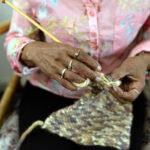Hearing loss can lead to isolation and loneliness
While hearing loss can occur at any age, it’s one of those conditions … like failing eyesight … that is more common among elderly people. About one in three elders will experience some degree of hearing loss. The prevalence of tinnitus – persistent ringing or buzzing in the ears – also increases with age.
Despite the high numbers of elderly people affected by hearing loss, less than one third of South Africans who could benefit from using hearing aids have them. Cost is a major factor, especially if you don’t have medical aid, or have a medical plan that doesn’t cover hearing tests and devices. Depending on the type of hearing aid recommended by your audiologist, you could be looking at a cost of anywhere between R15 000 to R120 000, excluding professional fees, follow up consultations and maintenance.
World Hearing Day on Friday 3 March aims to create awareness of hearing loss and promote ear and hearing care. We need to take care of our hearing because its loss can negatively affect our health.
Hearing and well-being
If you can’t hear what’s being said, it’s pretty well impossible to join in the conversation! Continually asking others to repeat what they just said is both frustrating and embarrassing. It’s easier to withdraw and say nothing. Which can lead to isolation, loneliness and depression.
Others may mistakenly think you are stand-offish, disinterested or uncooperative … especially if you’ve been asked a question and you don’t answer. Or they may assume you are confused and unresponsive.
In fact, studies have shown that older adults with hearing loss have a greater risk of developing dementia. Cognitive abilities (including memory and concentration) decline faster in those with hearing loss. The good news is that using a hearing aid can lower the risk.
What causes hearing loss?
Although it may be linked to prolonged exposure to loud noise when you were younger – e.g. working in a noisy factory or listening to loud music – hearing loss may also be caused by changes in the inner ear and auditory nerve as we age.
Certain health conditions, such as high blood pressure, diabetes, heart conditions, stroke or a tumour, can also affect hearing. So can medications taken to treat these and other diseases, including antibiotics and pain killers. Genetics may also play a role, e.g. being born with octosclerosis, a disease thought to be hereditary. The disease causes abnormal bone growth in the middle ear which, over time, leads to hearing loss.
Because it comes on gradually, you may not realise you are not able to hear as well as you used to. Or you may be embarrassed and try to hide it. Even though the effects of hearing loss are really debilitating, older people often don’t want to admit they have a problem.
How to cope with hearing loss
If you notice signs of hearing loss:
- Let your family and friends know you have a hearing problem, if they haven’t already realised.
- Eliminate background noise wherever possible. In a restaurant, ask to be seated at a table away from the kitchen and other diners. At home, turn off the TV or radio when people visit. Close windows to block out traffic or the neighbour’s mower.
- Ask the person talking to you to face you and speak slowly and carefully. Pay attention to facial expressions or gestures that help you understand what the person is saying.
- If you don’t understand what was said, ask the person to repeat it, and to use different words if you still can’t get it.
- In a group, try to have only one person speaking at a time.
- Make an appointment to see your doctor. Your hearing loss may have a physical cause that can be treated with medication. Or medication you’re already on may need to be changed.
- If you’re worried about being able to understand what the doctor says, take a friend or relative along with you, who can clarify anything you missed.
- Make an appointment with an audiologist or hearing aid specialist to measure your hearing loss and advise on suitable hearing devices for your needs.
How to tell if someone has a hearing problem
- They continually ask you to repeat yourself or say, “Sorry?” all the time
- They ignore you when you say something to them
- They misunderstand you, e.g. when you ask an elderly man if you should fetch his cap for him, he might look puzzled and say, “I don’t have a cat.”
- They turn the volume up high on the TV or radio
- They are reluctant to take phone calls
- They complain that others mumble or speak too softly
When trying to communicate with someone who has a hearing loss, please follow the Coping with Hearing Loss tips above. Avoid shouting at the person and letting your frustration show. It is just as frustrating for them!






 Concern and confusion over SASSA Old Age Grant payments
Concern and confusion over SASSA Old Age Grant payments Vote for us in the KZN Top Brand Award
Vote for us in the KZN Top Brand Award Men’s health – signs older men shouldn’t ignore
Men’s health – signs older men shouldn’t ignore Tafta commemorates Elder Abuse Awareness Day – staff say ‘No’ to elder abuse
Tafta commemorates Elder Abuse Awareness Day – staff say ‘No’ to elder abuse Elder Abuse – it’s not always what you think
Elder Abuse – it’s not always what you think Holiday fun that doesn’t break the bank – inexpensive activities for grandparents
Holiday fun that doesn’t break the bank – inexpensive activities for grandparents Old school ‘Granny Crafts’ promote mental health
Old school ‘Granny Crafts’ promote mental health Tafta Golf Day at Cotswold, a swinging success!
Tafta Golf Day at Cotswold, a swinging success! Come visit us – Tafta Open Days this May!
Come visit us – Tafta Open Days this May! Sleep Quantity vs. Sleep Quality – what matters most for healthy ageing?
Sleep Quantity vs. Sleep Quality – what matters most for healthy ageing?